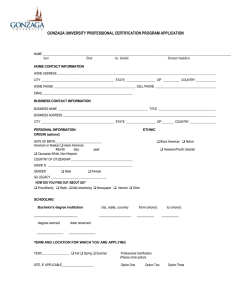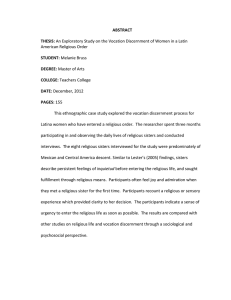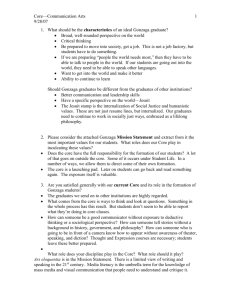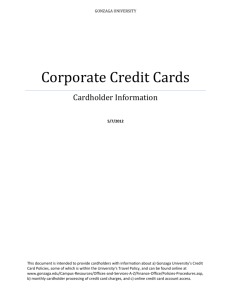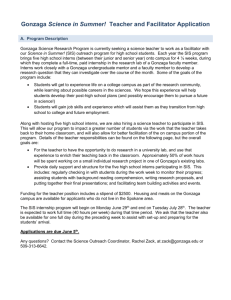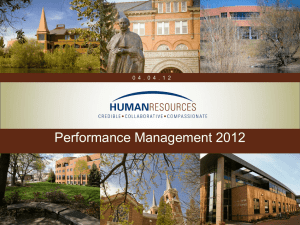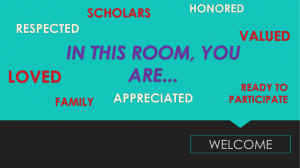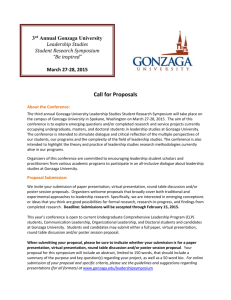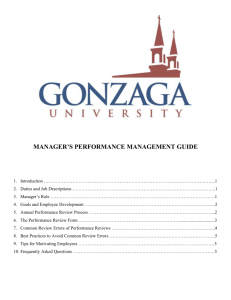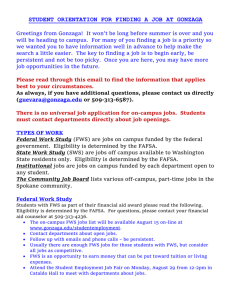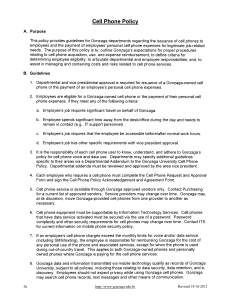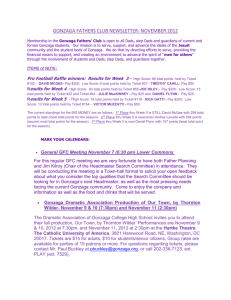Beyond Discipline: The Merger of Peter Lake*s
advertisement
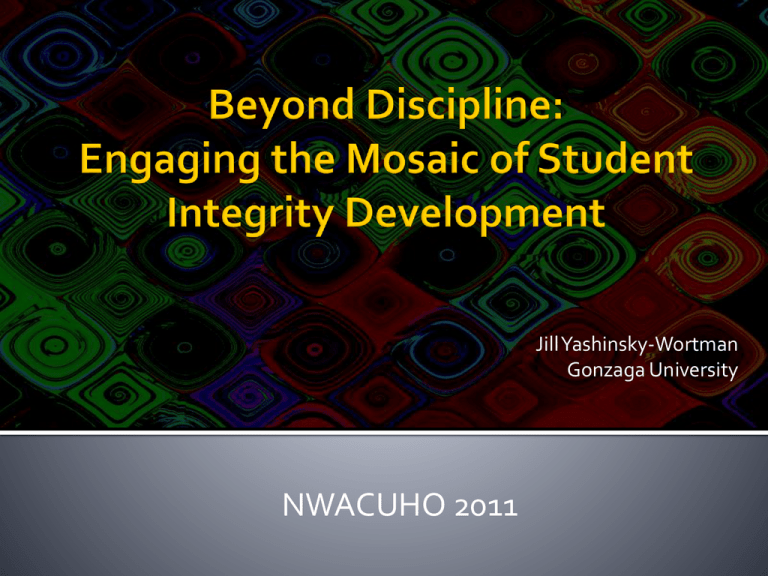
Jill Yashinsky-Wortman Gonzaga University NWACUHO 2011 Program attendees will Learn about the merger of Lake’s concepts into practice Consider approaching student behavioral issues using a whole person model Gain new sanctioning tools around wholeness, integrity, and values “The Romans had a perfect Latin word to describe and measure the quality of a person’s character, integritas. Ethically speaking, integrity means ‘the state or quality of being entire or complete.’ It means soundness, being unimpaired, having all of the component pieces fit together and be whole....” - p. 56-57 of Why It’s Hard to be Good by Al Gini All earlier behavioral intervention tools had been used with students but did not appear to be changing behaviors. We needed to support students through cognitive/developmental shift toward our values. We did not have the staff to individually mentor at-risk students so creating a cohort –based program was the most efficient and economical route. Freshman and Sophomore males Lacking life purpose/direction Limited to no extracurricular engagement/involvement on campus Are not intentionally thinking about their choices or making well thought out plans Beyond Discipline: Managing the Modern Higher Education Environment (2009, Hierophant Enterprises, Inc) 90% of the conduct we deal with on campus is really a failure in planning, intentionality and mentoring: ▪ Students leave their family value systems and have freedom they aren’t prepared for. ▪ College WAS the goal. Now what? ▪ They seek mentoring from peers that often works in opposition to the institution’s stated goals, values and mission, (but it’s fun!). Six week program Three components consisting of: Six in class sessions lasting 1-2 hours each Bi weekly one on one meetings with instructor A final project due within six weeks of completing the program 1. One takes pains to discern right from wrong. 2. Willing to shape one’s actions in accord with discernment. 3. Willing to acknowledge publicly what one is doing. Introduction of St. Ignatius SMART Goal Setting Decision Making “I'm sorry to say so but, sadly it's true that bang-ups and hang-ups can happen to you” - Dr. Seuss Values shield 168 hours in a week Who am I? How do I want others to see me? Who do I want to be? How do I want to be remembered? Green = helped you move toward your goals. Yellow= questionable as to whether or not it helped Red= detrimental to your goal Values congruence focus Values cards activity Speaker on Gonzaga’s values Integrity becomes the focus Integrity as wholeness The ripple effect Restorative Justice Video Case study Restorative justice plan Make a list of everyone who has been impacted by your choices. Circle the five people who have been most impacted. Now circle the five people who you care about the most on that list. Focuses on helping examine the impact of behaviors on a community. Regaining trust through good citizenship. Focuses on repairing harm. Willing to shape one’s actions in accordance with discernment. “Our inclination [is] to focus on individual rights but to neglect individual responsibilities…” p. 3 of Creating Campus Communities You and 10 other people are stranded on a deserted island. You are in charge of this newly forming island community. You need to come up with at least five rules that you would put into place for this community. Who will you be in the world? Work vs vocation Definitions of work Vocation Synonyms 1. Work, drudgery, labor, toil refer to exertion of body or mind in performing or accomplishing something. Work is the general word and may apply to exertion that is either easy or hard: Drudgery suggests continuous, dreary, and dispiriting work, esp. of a menial or servile kind: Labor particularly denotes hard manual work: Toil suggests wearying or exhausting labor: ▪ You are clear about your own values and who you are. ▪ You have chosen to be in environments that embraces who you are. ▪ Within those environments, you have chosen a vocation that both fills who you want to be and what that environment or community needs you to be. ▪ You can make a living off of that vocation. One is willing to acknowledge publicly what one is doing “The Last Lecture” concept Challenges: Students may still make choices that lead to their being invited to leave Gonzaga Not taking anything personal Week 3 Week 6 2.75 3 2.75 2.75 2.62 3 4. I am more intentional about my decisions 3 3.16 5. I am making less risky decisions than before 3 3.83 6. I am more aware of what it means to be at a Jesuit institution 7. I am living in ways that align with GU’s polices, values, and expectations more frequently 3 2.66 2.87 3.33 8. I am more aware of my future goals 3.25 3.33 1. My values have become more clear to me 2. I am living my values everyday more so than I was before this class 3. I am able to identify risky decisions better than I was prior to Integritas What our students say… “I think more about the consequences.” “I am more intentional than before.” “I have a better sense of what is at stake.” “The way I conduct myself affects so many other people.” JILL YASHINSKY-WORTMAN Student Life Case Manager Gonzaga University 509-313-4100 yashinsky@gonzaga.edu If your institution is implementing all or part of this program on your campus, please let us know! We would love to hear about how you are adapting it and the impact the course has on your students! We also have additional materials available via e-mail including PowerPoint presentations for each class session.
